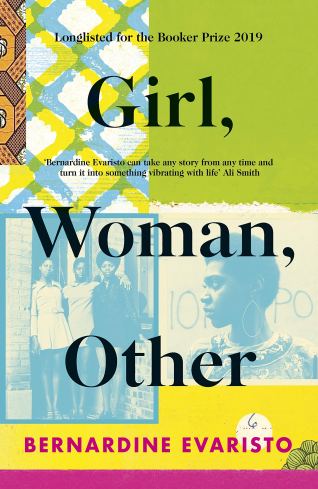This year’s joint winner of the Booker Prize has won almost universal praise by readers and critics alike. In addition to winning the Booker it was named by the Washington Post as one of the top ten books of this year and British-Nigerian writer Sarah Ladipo Manyika, writing in the New Statesman, described it as capturing modern-day Britain.
 What I liked about it, however, was less this grander aspect, but rather the quality of its story-telling. I must admit that 50 or so pages in, I was not overwhelmed! There are twelve characters in the book, all women bar one (who is trans), all black or mixed race. They are broken down into four groups of three, and each threesome is strongly connected in some way (eg mother/daughter). Each group is also connected with the others, even if only in a tenuous way (eg teacher and former pupil) and almost all are in some way connected to Amma, the first character we meet. Amma has written a play which is having its debut performance at the National and this provides the framework of the novel. Many of the characters are present at the penultimate chapter of the book, the after-party, where the differences between them and their lives are laid bare. This is interesting because the author is not only trying to draw out the similarities between the characters and their life experiences, suggested by their common characteristic of being mixed race and female, but she is also, I think, railing against the notion of such women/people being homogeneous; they are all far more than just their race or gender.
What I liked about it, however, was less this grander aspect, but rather the quality of its story-telling. I must admit that 50 or so pages in, I was not overwhelmed! There are twelve characters in the book, all women bar one (who is trans), all black or mixed race. They are broken down into four groups of three, and each threesome is strongly connected in some way (eg mother/daughter). Each group is also connected with the others, even if only in a tenuous way (eg teacher and former pupil) and almost all are in some way connected to Amma, the first character we meet. Amma has written a play which is having its debut performance at the National and this provides the framework of the novel. Many of the characters are present at the penultimate chapter of the book, the after-party, where the differences between them and their lives are laid bare. This is interesting because the author is not only trying to draw out the similarities between the characters and their life experiences, suggested by their common characteristic of being mixed race and female, but she is also, I think, railing against the notion of such women/people being homogeneous; they are all far more than just their race or gender.
The first chapter is about Amma, her daughter Yazz , and her friend Dominique. Amma and Dominique were radical feminists in their youth and started the Bush Women Theatre Company, to give voice to black and Asian women, particularly those with (then) non-mainstream sexualities. Amma’s daughter Yazz is the product of an “arrangement” between Amma and her friend Roland, a gay writer and academic. In chapter two we learn about her life, now at university (seems as if it’s Cambridge), her issues with her parents, her diverse group of friends – all bright, high achieving young women.
I did not warm to Amma and Yazz – they felt far too ‘urban elite’ when I thought I was supposed to be getting the whole of ‘modern day Britain’, plus I did not think Amma was particularly likeable and Yazz was quite obnoxious! It started to get much more interesting with Dominique, in whom we meet a character with far more depth and vulnerability, whose story seemed to have more texture.
In chapter two, we meet Carole, a woman from a poor inner-city background whose life appeared to be heading in one bleak direction until she was taken under the wing of a teacher who saw something special in her. Carole is now a high-flying banker. The other characters in this chapter are Carole’s mother Bummi, a traditional Nigerian woman who has brought Carole up alone, and LaTisha, Carole’s school friend whose life followed a more socially predictable path, but who, in her thirties and with three children, determines she will turn things around in her retail career where she excels.
There are two more chapters each with its own group of three women and the stories get ever more diverse and interesting. These women who come later are more ‘ordinary’ than the slightly smug Amma, Yazz and Carole, but for me their stories were the more interesting ones. Some are elderly women and we go back many years to learn about their past lives.
There were times when I would have liked a bit of a ‘family tree’ or a map to show all the connections, as it can get a little confusing with so many characters, but overall it is an artfully constructed book. This book is very much a mirror, multiple stories rather than one, but still the author manages to build a plot around the performance of Amma’s play and the after-party. There is also a brilliant plot twist at the end that I did not see coming at all, and really makes you reflect on all your assumptions about race, class and identity.
A thoroughly enjoyable book, my second from the Booker shortlist, and a worthy winner. I would like to read it again to see if, second time around, knowing what I do, I feel differently about the characters and their stories.
Highly recommended.
Did you agree with the judges that this book should have been joint winner?
If you have enjoyed this post, I would love for you to follow my blog. Let’s also connect on social media.
